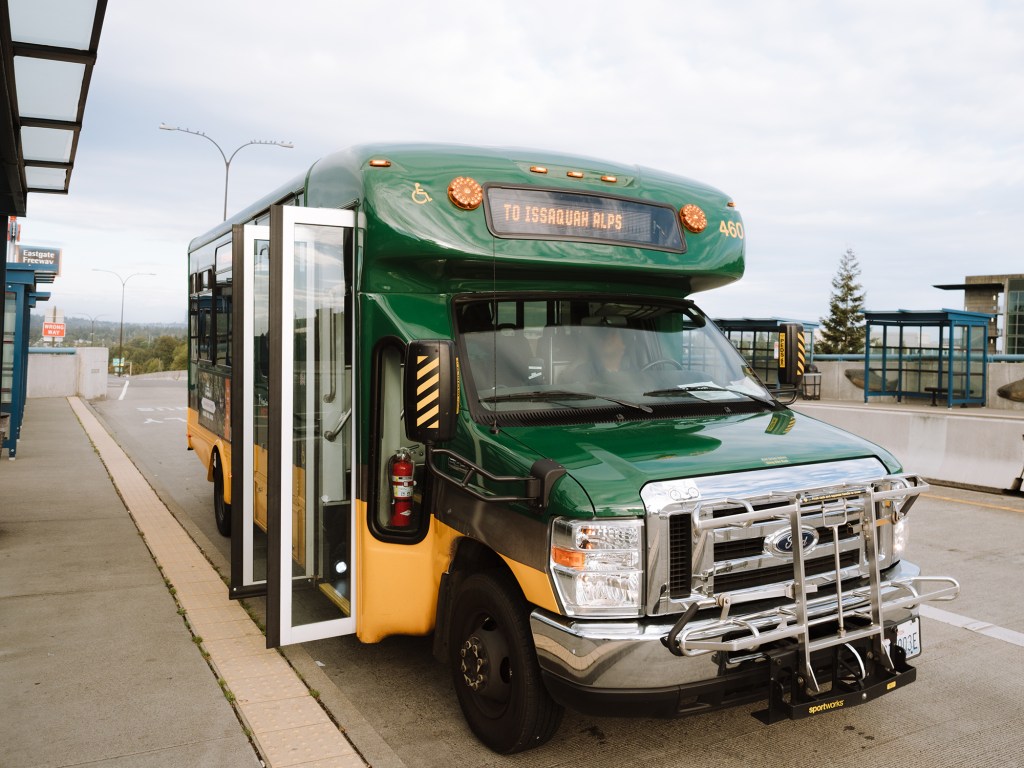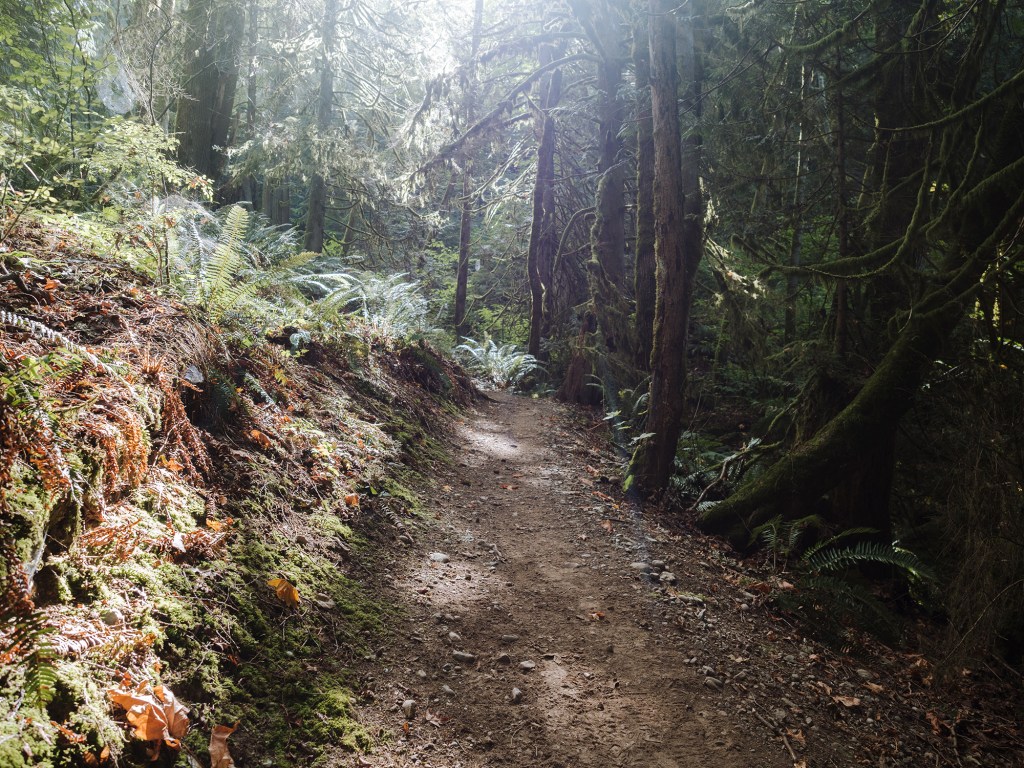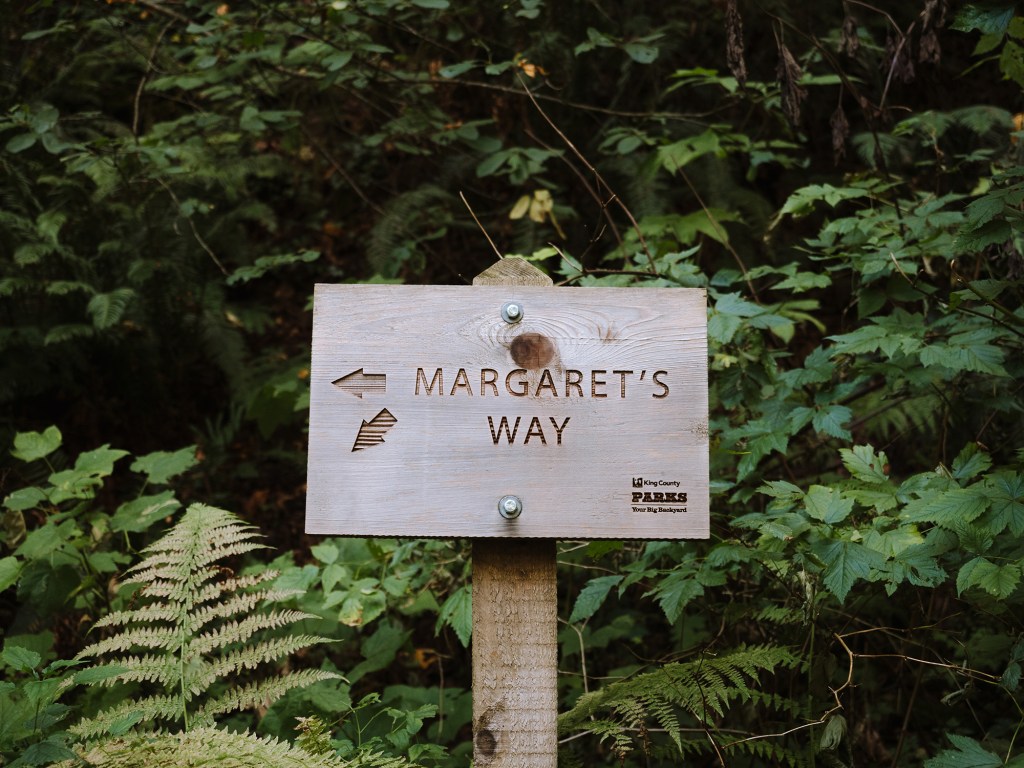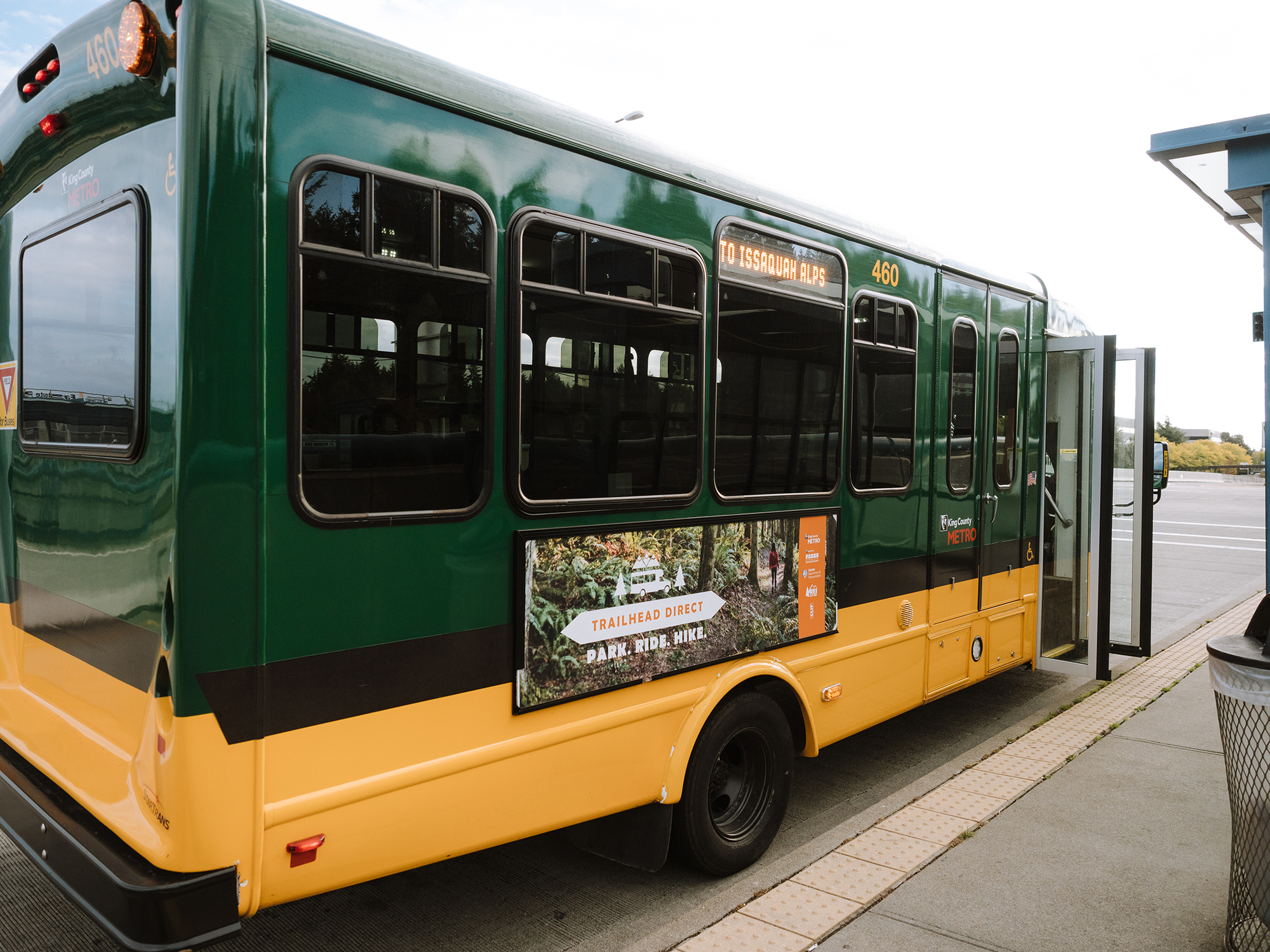I moved to Seattle six years ago via bicycle. Right away I heard about a popular trail called Mount Si and wanted to check it out. By car it’s a 45-minute jaunt, but I didn’t have a car. Two buses, two bike rides, and two-and-a-half hours later, I found myself at the trailhead. I did the 8-mile hike only to have to spend another two-and-a-half hours and plenty of energy doing it all in reverse. It was a full-day excursion.
If you don’t have a car and you live in an urban area in the United States, chances are, your options for getting to trails around you are limited. That leaves many people without access to green spaces. But two cities—Seattle and Los Angeles—are working to change that with public transit. This year, thanks to Seattle’s Trailhead Direct, I took one bus 30 minutes to reach a beautiful forested trail called Margaret’s Way in the Issaquah Alps. It was lovely to relax on my way to and from the trailhead.

We took Trailhead Direct from a park and ride. Photo Credit: Charlotte Gane
Case Study: Seattle
The problem: “For the past several years, we’ve all been experiencing the increasing demand of folks who want to head out to the I-90 corridor and hike all the trails,” Ryan Dotson, business development program manager for King County Parks in Seattle, said of the congestion that plagues the 50-mile stretch of Interstate 90 in the Seattle area on the weekends. “With the population boom in the region, it [has] put a lot of pressure on the trailheads in terms of congestion.”
Hikers, frustrated at lack of parking at trailheads, began parking illegally on busy two-lane highways, causing serious safety hazards. King County Parks approached Metro Community Connections during the summer of 2016 to form a working group—including REI and other outdoor partners—to figure out a solution.
The solution: Trailhead Direct now offers bus service from Seattle to the Issaquah Alps and Mount Si and Mount Teneriffe plus service from North Bend to Mailbox Peak, another popular trail featuring a mailbox at the top. The 2018 pilot has been made possible through a public-private partnership. This service runs weekend and holidays, offering pickups every 30 minutes from residential neighborhoods in Seattle as well as nearby Bellevue and North Bend, Washington.
The results: From April through July of this year more than 9,500 people boarded the Issaquah Alps and Mount Si shuttles (a data collection error has delayed initial numbers for Mailbox Peak). “The initial boarding numbers far exceeded our expectations and I think it’s fair to say we had a successful season,” Dotson said. During the month of October, King County Metro will be collecting feedback via on-board and online surveys, which will help inform the second full season of the pilot in 2019.
Joe Impecoven, an outdoor programs and outreach coordinator for REI in Seattle, is encouraged by the program. “This has been one of the most exciting and innovative projects REI has taken part in,” he said. “The program addresses a major access issue, cuts back on carbon footprints and creates equitable access, in a progressive way. I’m hoping it serves as a model for other innovative ideas in the future.”

Photo Credit: Charlotte Gane
Case Study: LA
The problem: LA found itself in a similar position to Seattle: Wanting to provide trail access to those who are car-less. Reduced traffic and parking were potential added benefits.
It all began in 2014, with an effort to create more access to open spaces around the time that the San Gabriel National Monument was designated. “Public lands are for the public. We need to be able to have access to them,” said Yvette Lopez-Ledesma, urban to wild assistant director of The Wilderness Society. “In a place like LA where it’s so sprawled out, we’re really embracing what these public lands are for—it’s really about promoting public access and getting out there.”
The solution: Three pilot programs have sought to provide public transit to trails in the San Gabriels from three suburbs of LA. The first bus shuttle was launched on April 7, 2016, and took passengers from the city of Duarte, northeast of LA, to the Fish Canyon Falls trailhead for free. It shut down after a June 2016 fire closed the trail. In September of that same year, a second pilot took passengers from the parking lot of the REI Arcadia store to the Chantry Flat Recreation Area for free. Currently, the Angeles National Forest is working to find funding for a permanent program to provide access to Chantry Flat and beyond.
The third and most recent transit to trails pilot program, which costs 75 cents per ride, launched this year and shuttled people from the Memorial Park Metro Gold Line Station in Pasadena to the Sam Merrill trailhead in Altadena. This project was provided by the city of Pasadena and funded primarily by Los Angeles County. Numbers for this most recent shuttle looked promising, according to Tori Kjer, Los Angeles program director for the Trust for Public Land.
The results: The Memorial Park to Sam Merrill trailhead six-month demonstration shuttle had 9,601 riders from April through August, with about 14 riders getting on or off at the trailhead per day. For weekend service, this was above average for a point of interest in the Pasadena Transit bus system, according to Sebastián Andrés Hernández, transit division senior planner for the city of Pasadena. However, while the city of Pasadena identified the route as viable, some Altadena community members have voiced concerns about large vehicles in a quiet residential area. Los Angeles County plans to work with Altadena residents to identify a route that could potentially be operated in the future.
At REI we believe in public transit to trails, which is why we’ve invested resources and funding into these two programs. “As we think about creating access to inspiring outdoor places, transit-to-trails shuttles and alternative transportation options ensure there is access for all to our trails,” said Taldi Walter, community and government affairs manager for REI. “As we work to increase and maintain access to public lands, invest in the outdoors and reduce the barriers to entry, these programs are a great way to make the connection between urban environments and the outdoors.”

We got off at Margaret’s Way, a trail in Washington. Photo Credit: Charlotte Gane
Editor’s note: REI has partnered with the King County Parks and Metro Community Connections to help launch Seattle’s transit pilot programs since 2017, and has awarded the programs with $25,000 to date. REI has also partnered with The Wilderness Society and the National Forest Foundation to advocate for sustainable access and stewardship within the San Gabriel Mountains National Monument and Angeles National Forest through funding from a $300,000 Rewilding Grant over the course of three years.
If you’ve tried Seattle’s Trailhead Direct, complete this survey to have a say in next year’s pilot!


